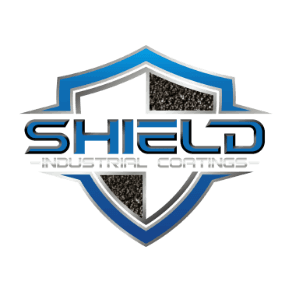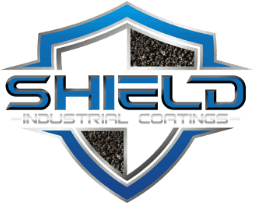If you are looking for a strong, protective industrial coating, you have likely been considering one of polyurea or epoxy. Industrial protective coatings are often applied to concrete flooring in order to improve durability, safety, longevity, and appearance. They can also be applied to a wide range of other surfaces, such as bed liners for trucks and jeeps.
In this blog post, your expert team at Shield Industrial Coatings will highlight everything you need to know about epoxy and polyurea coatings. We will also pit these two options against each other and see which one comes out on top in terms of longevity, durability, cost, maintenance, cure time, and more. For USA-made polyurea, we are your premier choice.
What Is Polyurea?
Polyurea is a type of polymer, a material made up of large molecules strung together. The structure of a polymer makes it tough and elastic and an excellent choice within the construction industry. Polyurea compounds can be formulated and customized to increase flexibility and strength.
When used on a concrete floor, polyurea bonds to the moisture, which creates a barrier that protects against the elements, scratches, and various types of damage.
What Is Epoxy?
Epoxy is another type of polymer. Epoxy coating consists of two distinct elements: a polyamine hardener and an epoxy resin. While epoxy is typically more affordable than polyurea, it doesn’t stand up to polyurea in terms of durability, longevity, and other important considerations.
How Do They Stack Up Against Each Other?
In this section, we will highlight the differences between polyurea and epoxy coatings so that you can make an informed decision for your next project.
Longevity
One of the most important considerations when choosing between epoxy and polyurea coatings is longevity. Here, there is one clear winner (as there is with pretty much every category), which is polyurea.
Epoxy typically lasts for three to five years before wear and deterioration start to become apparent. With polyurea, you can expect a far longer lifespan, upwards of around 15 years, meaning you will get at least a decade more than epoxy.
For the long-term choice, polyurea is your premier option.
Durability
Epoxy has long been a popular choice and has been marketed as highly durable. Certainly, when it comes to floor coatings, epoxy has the ability to withstand scratching, chemicals, tire marks, stains, and general impact.
However, it has a relatively short expected lifespan, and wear is going to become apparent within a few short years. What’s more, UV heat will result in yellowing to epoxy in outdoor areas. By comparison, polyurea is UV resistant, which makes it a wonderful choice for pool decks, outdoor patios, sidewalks, and driveways.
Polyurea is many times stronger than epoxy coatings and is highly resistant to damage. It is chemical resistant and can withstand higher temperatures than epoxy. For peace of mind against spills, impact, and scratches, polyurea is the clear choice.
Cost
For many people, both homeowners and contractors, the cost will be one of the main considerations. We have already highlighted that polyurea is more expensive than epoxy, though it stands as a better long-term option.
Epoxy is the economical option, costing around $3-4 per square foot installed. In a two-car garage, the average cost of epoxy coating is approximately $1,500 to $1,800.
Polyurea, as the premium option, costs around $5-7 per square foot installed. This puts the cost of a typical two-car garage will cost between $2,000 and $2,800. As you are paying for the extra durability and longevity, polyurea is a better choice for your money.
Maintenance
As we have noted, polyurea flooring is more resistant to abrasions, chemicals, and overall physical impact. Because of this, spills should not cause any damage or harm to the coating, though it is still recommended to clean up any spills for aesthetic purposes.
The top coating of polyurea will remain glossy for many years, though it can also be waxed and polished as desired. Mopping a polyurea floor coating with a cleaning agent and water will also help to keep it in tip-top condition for longer.
For epoxy, it is important to clean up any chemical spills, such as oil or antifreeze, so that they do not damage the floor. In environments such as factories and warehouses, it can also help to use welding mats for extra protection.
Cure Time
Shield Industrial Coatings’ USA-made polyurea is quick setting with a cure time of just ten seconds to the touch and 30 seconds before weight can be applied. This allows for a fast turn-around time for both the applicator and the consumer.
In the case of traditional epoxies, you can expect to have to wait up to seven days for full cure time. Clearly, there is only one winner between polyurea and epoxy when it comes to curing time.
Polyurea vs Epoxy Floors: Which One Is Better?
The bottom line is that polyurea floors are a far better choice than epoxy. Polyura comes up the winner across the board. In every category, it can be seen that polyurea is a better choice for floors and a host of other surfaces (including within the oil and gas industry).
If you would like to learn more about polyurea flooring, speak to the expert team at Shield Industrial Coatings. We are based in Spring, TX. We have been providing the best support and training to business owners for many years.
Click here to check out our range of polyurea industrial coatings.

